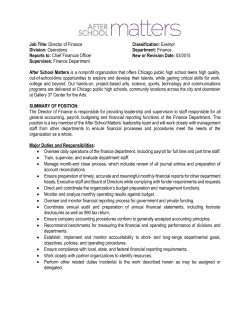
AQ 2015 - DePaul University Academics
The First-Year Program HON 111: Honors Explore Chicago Autumn Quarter 2015 Course Chicago in Film Faculty Douglas Long Communication Diverse Faces of AIDS: Prevention Education Treatment Leah Neubauer Psychology Recommended for students in the CSH Pathways Honors Program. The Radical Tradition in Chicago Colleen Doody History firstyr@depaul.edu UPDATED 4/15/2015 Description For more than a century, Chicago has had a close relationship with the movies. In this course we will visit sites where films were made and where others were set, and we’ll see some of Chicago’s unique movie theatres. We will screen and study several Chicago-connected films and meet some people who have been involved. The city’s film production history goes back to the silents, when Charlie Chaplin made a slapstick comedy here, and continues through the present with dramas such as Public Enemies. Chicago’s history has been reflected in many films including some that chronicle, and sometimes glorify, its gangster past (1932’s Scarface, The Untouchables). And during the 1980s, many classic film comedies came out of Chicago, including The Blues Brothers and Ferris Bueller’s Day Off. (Note: This class has an additional Friday afternoon “lab” session for movie screenings.) This course is designed to introduce students to one of the most critical and intriguing health issues in history— the AIDS epidemic. Students will learn about the diverse range of individuals impacted by HIV/AIDS and the range of prevention, education, treatment, and advocacy services that are offered throughout the Chicago metropolitan area. As students interact with those who live with HIV/AIDS and who provide AIDS-related services, they will experience the human face of AIDS, and will explore the social, psychological, political, religious, and legal dimensions of this epidemic. This course will cover the following topics in the AIDS epidemic: history and epidemiology; transmission and disease progression; education and prevention; traditional medical and psychosocial treatment; spirituality and alternative treatments; housing and hospice care; policy and advocacy. The course is also designed to present a multicultural perspective on the AIDS epidemic, thus students will interact with individuals and agencies representing a range of ages, genders, ethnicities, sexual orientations, socioeconomic statuses, and serostatuses (HIV+/HIV-). Chicago has a rich tradition of radicalism. In this class, we will explore a few of the city’s radical movements and people from the last one hundred and thirty years—German-American anarchists, African-American communists, student anti-war protesters, and socialist feminists. As a system of belief, it is notoriously hard to pin down and assign a consistent meaning to the term radicalism. We will explore the varied ideas and actions of our chosen subjects so that we can ultimately explain what we mean when we label all of these groups as radical. This course will focus on four topics—the Haymarket riot, Richard Wright and African-American communism, the anti-war protests of August 1968, and the Chicago Women’s Liberation Union of the late 1960s and early 1970s. We will use a variety of different sources—web pages, primary source documents, novels, cemetery monuments, and videos—to explore these topics. In addition, students will do a variety of different types of writing exercises—informal individual journal writing, small group projects, and more formal individual papers. HON 111: HONORS EXPLORE CHICAGO AUTUMN 2015
© Copyright 2025









